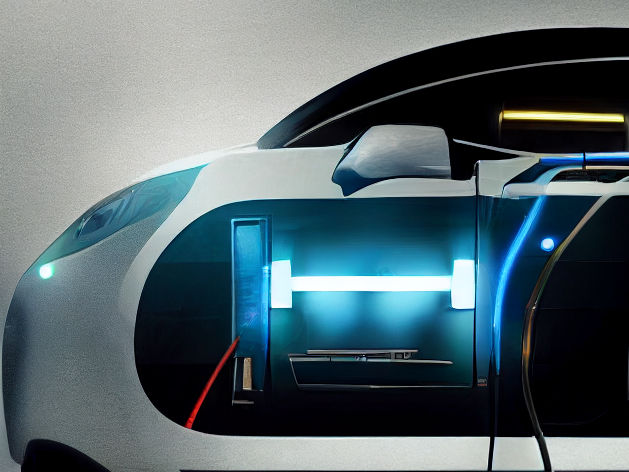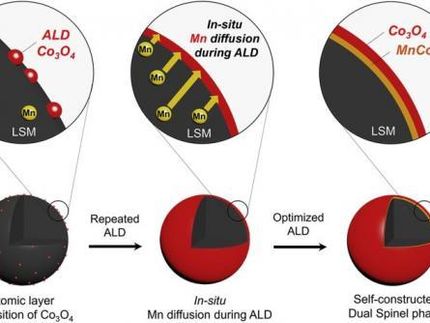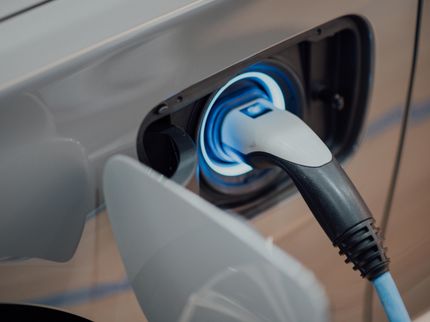Fast charging over 10,000 cycles: Harvard engineers’ solid-state battery technology points to a leap in performance and reliability
Startup granted technology license from Harvard to scale innovative lithium-metal battery technology for commercial deployment
Advertisement
Harvard’s Office of Technology Development has granted an exclusive technology license to Adden Energy, Inc., a startup developing innovative solid-state battery systems for use in future electric vehicles (EVs) that would fully charge in minutes. Adden Energy has closed a seed round with $5.15M in funding led by Primavera Capital Group, with participation by Rhapsody Venture Partners and MassVentures.

Symbolic image
Computer generated Picture
The license and the venture funding will enable the startup to scale Harvard’s laboratory prototype toward commercial deployment of a solid-state lithium-metal battery that may provide reliable and fast charging for future EVs to help bring them into the mass market.
Developed by researchers in the lab of Xin Li, PhD, Associate Professor of Materials Science at Harvard John A. Paulson School of Engineering and Applied Sciences (SEAS), the lab-scale coin-cell prototype has achieved battery charge rates as fast as three minutes with over 10,000 cycles in a lifetime, with results published in Nature and other journals. It also boasts high energy density and a level of material stability that overcomes the safety challenges posed by some other lithium batteries.
Adden Energy was co-founded in 2021 by Li, along with William Fitzhugh, PhD ’20, and Luhan Ye, PhD ’22, both of whom contributed to the development of the technology as graduate students in Li’s Harvard lab. Fred Hu, PhD ’93, founder and Chairman of Primavera Capital, is also a founder of Adden Energy.
The startup aims to scale the battery up to a palm-sized pouch cell, and then upward toward a full-scale vehicle battery in the next three to five years. “If you want to electrify vehicles, a solid-state battery is the way to go,” said Li, who is a scientific advisor to Adden Energy. “We set out to commercialize this technology because we do see our technology as unique compared to other solid-state batteries. We have achieved in the lab 5,000 to 10,000 charge cycles in a battery’s lifetime, compared with 2,000 to 3,000 charging cycles for even the best in class now, and we don’t see any fundamental limit to scaling up our battery technology. That could be a game changer.”
Fitzhugh, CEO of Adden Energy, noted that in 2019, 29% of U.S. carbon dioxide emissions were produced by transportation. “Complete electrification of the vehicle fleet is one of the most meaningful steps we can take to fight climate change,” he said. “However, broad adoption of electric vehicles requires batteries that can meet a diverse set of consumer needs. For example, 37% of Americans don’t have garages at home, so at-home overnight charging is not possible. In order to electrify this segment, EVs need to recharge at comparable times to internal combustion vehicles, essentially in the time you’d currently spend at the gas pump.”
The technology developed at Harvard, which includes core innovations in solid-state battery design and electrolyte production methods, may offer other crucial advantages.
“Typically, lithium-metal anodes in other solid-state designs develop dendrites, twig-like growths that can gradually penetrate through the electrolyte to the cathode. We defeat the growth of dendrites before they can cause damage, by novel structural and material designs,” said Ye, who is now CTO of Adden Energy. “As a result, the device can sustain its high performance over a long lifetime. Our recent study shows that this nice feature can also be maintained at scale-up.”
“Climate change is the defining challenge facing the world. It is more important than ever to accelerate the transition to clean energy and zero-emission transportation,” said Hu, who also serves on the Global Board of the Nature Conservancy. “Adden Energy’s mission is to develop cutting-edge battery technologies, thereby enabling mass adoption of electric vehicles and contributing to a greener and more sustainable global economy.”
“Electric vehicles cannot remain a luxury fashion, literally the ‘one percent’ of vehicles on the road, if we are to make progress toward a clean energy future, and the U.S. won’t have a used-car market if EV batteries last only 3 to 5 years,” added Li. “The technology needs to be accessible to everyone. Extending the lifetime of the batteries, as we’re doing here, is an important part of that.”
The solid state battery research advances in Li’s Harvard lab that have been licensed to Adden Energy were enabled in part by funding from the University’s Climate Change Solutions Fund, which supports research and policy initiatives addressing climate change, the transition to clean energy, and related health impacts; and from Harvard OTD’s Physical Sciences and Engineering Accelerator, which advances researchers’ most commercially promising innovations toward the launch of new startups and industry engagements. Li’s lab has also received funding in support of solid-state battery research from the Massachusetts Clean Energy Center (MassCEC) Catalyst Program, the Harvard Data Science Initiative, the Harvard FAS Dean’s Competitive Fund for Promising Scholarship, and the U.S. Department of Energy.
Other news from the department science
Most read news
More news from our other portals
Something is happening in the chemical industry ...
This is what true pioneering spirit looks like: Plenty of innovative start-ups are bringing fresh ideas, lifeblood and entrepreneurial spirit to change tomorrow's world for the better. Immerse yourself in the world of these young companies and take the opportunity to get in touch with the founders.
See the theme worlds for related content
Topic World Battery Technology
The topic world Battery Technology combines relevant knowledge in a unique way. Here you will find everything about suppliers and their products, webinars, white papers, catalogs and brochures.

Topic World Battery Technology
The topic world Battery Technology combines relevant knowledge in a unique way. Here you will find everything about suppliers and their products, webinars, white papers, catalogs and brochures.






























































